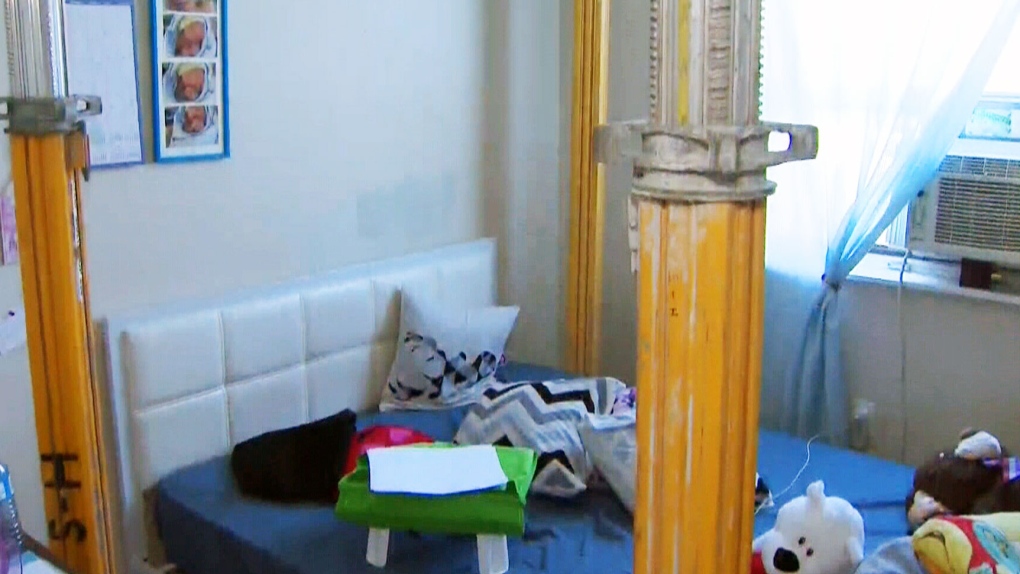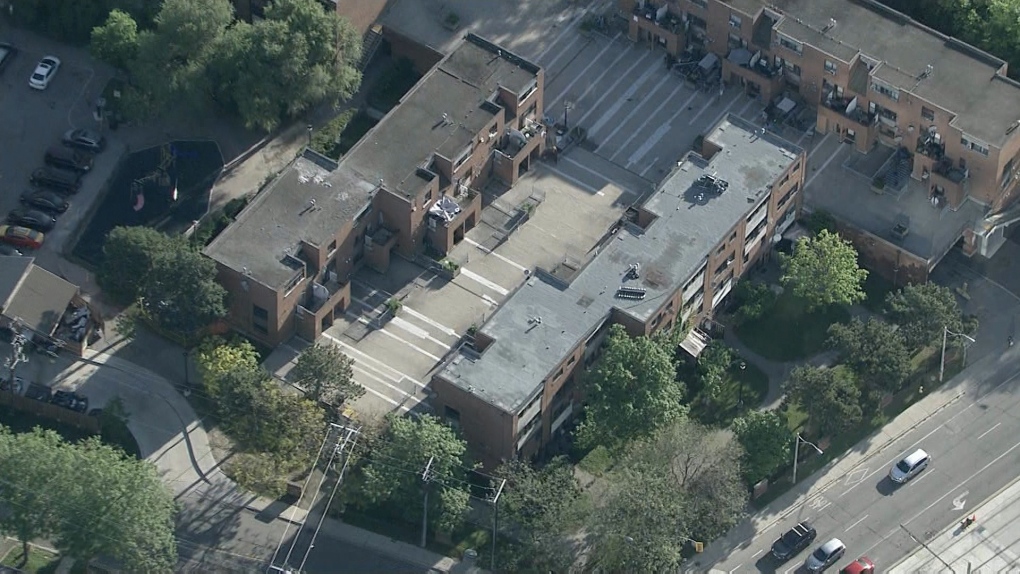Toronto Community Housing looking to demolish 'unsalvageable' Swansea Mews complex
A 154-unit public housing complex in Toronto’s west end that was deemed unsafe for occupancy last June after a ceiling collapse seriously injured one of its tenants could soon be demolished.
On Friday, Toronto Community Housing Corporation (TCHC) will be seeking authorization from its board of directors to apply to the City of Toronto for a permit to tear down Swansea Mews at 21 Windermere Ave.
“Our staff and team of independent engineers have determined that the best course of action to guarantee the safety of our tenants was to demolish the buildings located in our Swansea Mews community. That is why we are seeking to apply for a permit with the City as the buildings are unsalvageable,” a TCHC spokesperson wrote in a statement emailed to CP24.com.
In a nine-page report, which will be presented to the board at the upcoming meeting, TCHC staff pointed to two different engineer reports which found that the nine residential blocks in the complex near The Queensway and Windermere Avenue are “not safe for occupancy.”
The report further stated that “another failure could occur at random and there was no way of knowing absent destructive testing which units were safe to occupy.”
Roughly three weeks after the May 27 incident, the city issued an 'Order to Remedy Unsafe Building’ to Toronto Community Housing Corporation for Swansea Mews. That June 12 order required the housing provider to relocate any remaining tenants until work was completed that would make the buildings safe for them to return.

Even before the emergency situation, TCHC had planned to do a “deep retrofit” of the west-end property. In fact, the ceiling collapse occurred just few months before a Request for Proposals was to be issued for revitalizing the aging complex, according to local councillor Gord Perks. Construction was set to begin this year.
That plan completely changed course after an extensive investigation by third-party architectural and structural engineers determined that “failure to demolish the townhouse units would present ongoing risks for tenants.”
“As such, we have decided to move away from repairs and refurbishment to meet safety requirements,” TCHC told CP24.com.
Hundreds of tenants were displaced
The ceiling collapse at Swansea Mews displaced approximately 420 tenants.
Some former tenants residents who spoke with CP24.com said that the complex was once well kept, but was allowed to fall into disrepair in recent years.
“It’s really sad,” Stephanie Hopps said, adding Swansea Mews was a place where “everyone helped each other.”
Hopps grew up in the TCHC community and still keeps in close contact with several people who used to live there.
Her mother, Sandra Westwood, lived at Swansea Mews for 38 years until she was forced to relocate last summer when the complex was deemed unsafe. Hopps said the abrupt move has been hard on her mom, whose mental health has been “tremendously” affected by it. Westwood, a mother of five, was well-known and very involved in Swansea Mews where she served as the vice-president of the resident group among other things.
At this point, the TCHC said it’s “too early” to say what a potential rebuild and/or replacement of units at Swansea Mews will look like. One notable requirement for approving the demolition permit will be that all units must be equivalently replaced.
The housing corporation is assuring all tenants that they will be engaged in the planning and development process and that they will have the “opportunity to return to Swansea Mews once it is safe to do so.”
Perks, meanwhile, said that while the demolition of Swansea Mews comes as a “shock,” the TCHC is “doing the right thing” by moving forward.
“Very little is as devastating as losing your home,” he said, noting the kind of construction flaw discovered at Swansea Mews has never before been seen in all of North America.
Demolition could still be months away
For now, there is no specific timeline when Swansea Mews could be taken down, however the approval of a demolition permit typically takes six to eight months. It could run up 24 months, however, if rezoning is required.
As for what will be built in its place, that too remains unclear.
Mark Richardson, of HousingNowTO, a volunteer-run group that tracks affordable developments and redevelopments in Toronto, said the city is in the midst of a housing crisis and low-density developments like Swansea Mews are not ideal.
“There’s a finite amount of land in the city of Toronto,” he said.
“That scale worked in 1973, but it’s not 1973 anymore. … The math has to work.”
Richardson said the new approach to affordable housing development can be seen in Regent Park, Alexandra Park, and near Queen Street East and Coxwell Avenue where mixed-use communities with a range of housing options at various price points are being built.
“All of these projects require a large amount of height and density and the creation of market units to offset the incredibly high costs of building new rent-geared-to-income social housing units,” he noted.

At this time, the ongoing cost of security as well as shoring at Swansea Mews is roughly $326,000 a month.
Toronto Community Housing said for now its focus is to seek approval from the City of Toronto for the demolition permit and once that process starts to move forward staff would be looking for ways to reduce overhead costs.
Options to fund the demolition and the complex’s replacement are also being explored, TCHC noted in the report.
CTVNews.ca Top Stories

Donald Trump says Canada becoming 51st U.S. state 'a great idea'
U.S. President-elect Donald Trump is taking aim at Canada once more, saying it would be 'a great idea' to make it America's ‘51st state.'
After scamming their victims, some con artists go on to scam our courts with impunity
Convicts, including fraudsters, are skipping out on their court-ordered payments to their victims to the tune of tens of millions of dollars across the country, according to figures obtained by CTV W5.
There are 88 new Order of Canada appointees. Here's a look at some of the most notable names
Ryan Reynolds, Scott Oake and Maureen Ann Jennings are among the 88 new recipients of the Order of Canada.
Synagogue on Montreal's West Island targeted by alleged arson
A synagogue on Montreal's West Island was the target of an alleged arson attack.
'You're either with Beijing or you're with Washington': Ford says to Mexico in CNN interview
Ontario Premier Doug Ford has a message for Mexico as the threat of tariffs by incoming president Donald Trump hangs over both sides of the U.S. border.
NEW These seniors were hit by the affordability crisis in a different way. They're having to support their children and grandchildren
With the high cost of living increasingly a concern, some seniors are making sacrifices to help their adult children and grandchildren make ends meet. Here are some of their stories.
Restaurants that charge tax during holiday break could get investigated by CRA: industry expert
Restaurants that fail to honour the holiday tax break could be investigated by the Canada Revenue Tax Agency, according to the Ontario Restaurant Hotel and Motel Association.
Quebec man pleads guilty to spreading hate speech about Jews, trying to make 3D-printed guns
A Quebec man has pleaded guilty to attempting to manufacture multiple firearms with a 3D printer, including an AR-15, and spreading hate speech about the Jewish community.
The barriers and benefits as a global bank looks to branch out in Canada
It's not every day, or even every decade, that a big foreign bank decides to have a go at Canada's retail banking market. But Spain's Banco Santander is poised to be among the few that have tried as it nears the all-clear to expand in Canada.

































